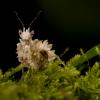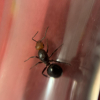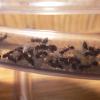Formica social parasites are different from Lasius, but easier to found. They only need Formica pupae, which the queens are capable of caring for and opening. Some raiding species may be more dependent on host workers than others.
I was thinking I would put her test tube in a container with test tube containing a Formica queen and some brood. That way she could either take the brood or join the existing queen and eventually succeed her.
When sanguinea group Formica found a colony, they do so by scaring off or killing the adult members and raising the abandoned brood as her own.
Edited by Batspiderfish, July 29 2017 - 6:14 PM.
If you've enjoyed using my expertise and identifications, please do not create undue ecological risk by releasing your ants. The environment which we keep our pet insects is alien and oftentimes unsanitary, so ensure that wild populations stay safe by giving your ants the best care you can manage for the rest of their lives, as we must do with any other pet.
Exotic ants are for those who think that vibrant diversity is something you need to pay money to see. It is illegal to transport live ants across state lines.
----
Black lives still matter.




















